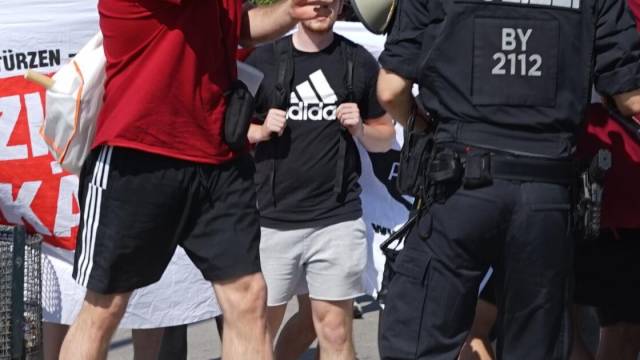“AnAntifamember confronting police in Augsburg.
Guest post by Drieu Godefridi
On November 13, 2025, the United States took a significant step by officially categorizing four far-left European organizations, including Antifa Ost, as Foreign Terrorist Organizations. This decision was not politically motivated; the evidence against these groups resembles a paramilitary organization’s charge sheet: assaults with hammers, shootings, Molotov cocktails, bombings, and improvised explosive devices targeting civilians, law enforcement, journalists, businesses, and public infrastructure.
In essence: terrorism disguised as a righteous cause.
This American action followed Hungary’s lead, which in September 2025 designated Antifa Ost as a terrorist group following a series of coordinated attacks in Budapest, including burned police vehicles, vandalized shops, and assaults on right-wing activists.
While Brussels engages in vague discussions about “complex contexts,” Washington applies a strategy akin to that used against jihadist and drug cartels: freezing assets, disrupting networks, and criminalizing any support. In the U.S., anyone who materially aids these groups faces up to 20 years in prison.
The evidence against them is damning.
Antifa Ost, based in Leipzig and Berlin, has claimed responsibility for numerous targeted attacks, including a hammer assault at a conservative conference in Saxony and the arson of a police training facility in Bavaria.
In Italy, the International Revolutionary Front produces homemade explosive guides and disrupts union marches that do not align with their revolutionary ideology.
In Greece, Armed Proletarian Justice opened fire on a shipowner’s headquarters, while Revolutionary Class Self-Defence detonated a bomb in central Athens, causing serious injuries to civilians.
These actions are not random; they stem from a clearly articulated doctrine found in encrypted messages:
“Strike the class enemy wherever he is found.”
This message has been sanitized by parts of the European press, where violence seems permissible when committed under red and black banners.
The hypocrisy is striking.
Recall the 2023 attacks in Budapest during Honour Day: fifteen militants, including Germans and Italians, roamed the city armed with hammers, telescopic batons, and tear gas, resulting in nine victims with broken bones and lasting injuries. This coordinated, cross-border assault exemplifies terrorism. Yet one of the attackers, Ilaria Salis, an Italian national, became a member of the European Parliament in 2024, shielded by parliamentary immunity and funded by European taxpayers.
If it weren’t true, it would seem like satire.
The U.S. State Department has made it clear:“Left-wing terrorism does not enjoy ideological immunity.”
This is a sentiment that should resound in Paris, Berlin, and Brussels.
The transatlantic implications are significant.
Financial tracking—covering crypto donations, Patreon collections, and encrypted transfers—is now a joint effort between the U.S. Treasury and European intelligence agencies. German universities that previously served as recruitment grounds for Antifa Ost have been ordered to cooperate with federal authorities. Under pressure from Hungary and Poland, the EU is finally, albeit reluctantly, considering a unified terrorist list that would include far-left networks that have long operated without scrutiny.
This is not an “ideological crackdown.”
It represents a long-overdue confrontation with groups that kill, injure, and instill fear while adhering to a stagnant utopian ideology that increasingly aligns with Islamist movements under the guise of “shared struggle.”
Critiquing capitalism is not terrorism; threatening a political opponent with a hammer is.
The First Amendment in the U.S. ends where incitement to violence begins—a lesson Europe should relearn.
The era of selective outrage is coming to a close.
Antifa is no longer viewed as the media’s favored “militant subculture.” It is now recognized for what it truly is: a transnational paramilitary network, a cult of political violence, and the West’s most overlooked blind spot.
The hammer has fallen.
Drieu Godefridi is a jurist (University Saint-Louis, University of Louvain), philosopher (University Saint-Louis, University of Louvain), and PhD in legal theory (Paris IV-Sorbonne). He is an entrepreneur, CEO of a European private education group, and director of PAN Medias Group. He is the author of The Green Reich (2020).
You can follow Drieu on X.
 Telegram is where we really talk. Don't miss out!
Telegram is where we really talk. Don't miss out!









